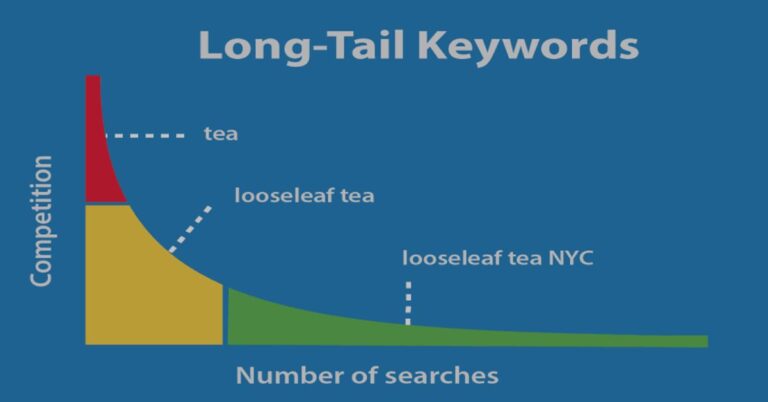When it comes to content marketing, keywords are like the map that shows you exactly where your target audience wants to go. Without them, your content is just floating around, lost in the endless ocean of the internet. Search engines use keywords to connect people with the right information, making them the foundation of any successful digital strategy.
Understanding Keyword Research Basics
What is Keyword Research?
Keyword research is the process of finding and analyzing words and phrases people type into search engines. It helps you understand what your audience is searching for and how you can create content to match their needs.
The Difference Between Short-Tail and Long-Tail Keywords
-
Short-Tail Keywords: Broad, one-to-three-word phrases like “digital marketing.”
-
Long-Tail Keywords: Longer, more specific phrases like “best digital marketing tools for small businesses.”
Pros and Cons of Short-Tail Keywords
-
Pros: High search volume, broader reach.
-
Cons: Very competitive, lower conversion rates.
Pros and Cons of Long-Tail Keywords
-
Pros: Lower competition, higher conversion rates, more targeted audience.
-
Cons: Lower search volume, requires more effort to cover different variations.
Importance of Keyword Research for Content Marketing
Driving Targeted Traffic
By using the right keywords, you attract people who are genuinely interested in your content or services.
Improving SEO Ranking
Search engines reward keyword-rich, high-quality content by pushing it higher on results pages.
Understanding User Intent
Keywords reveal what users really want—whether they’re just looking for information, comparing products, or ready to make a purchase.
Types of Keyword Search Intent
-
Informational Keywords: “How to start a blog.”
-
Navigational Keywords: “Facebook login page.”
-
Transactional Keywords: “Buy iPhone 14 online.”
-
Commercial Investigation Keywords: “Best budget laptops 2025.”
Steps to Effective Keyword Research
-
Brainstorm Seed Keywords – Start with broad terms related to your niche.
-
Use Keyword Research Tools – Explore keyword variations and data.
-
Analyze Competitors’ Keywords – See what’s working for others.
-
Check Keyword Metrics – Look at search volume, CPC, and difficulty.
-
Focus on Long-Tail Opportunities – Capture niche traffic that’s easier to rank for.
Best Tools for Keyword Research
-
Free Tools: Google Keyword Planner, Ubersuggest, AnswerThePublic.
-
Paid Tools: SEMrush, Ahrefs, Moz, KWFinder.
-
Choosing the Right Tool: If you’re just starting, free tools work fine. For professionals, paid tools offer deeper insights.
Advanced Keyword Research Techniques
-
LSI Keywords – Related terms that help search engines understand context.
-
Voice Search Optimization – Focus on conversational, question-based keywords.
-
Seasonal and Trending Keywords – Take advantage of holidays, events, or viral topics.
-
Local SEO Keywords – Target people searching within specific locations.
Creating Content Based on Keywords
-
Mapping Keywords to Content – Each keyword should align with a piece of content.
-
Keyword Placement Best Practices – Place keywords naturally in the title, headings, intro, and conclusion.
-
Avoiding Keyword Stuffing – Focus on readability first, search engines second.
Measuring the Success of Your Keyword Strategy
-
Track rankings with SEO tools like Ahrefs or SEMrush.
-
Monitor organic traffic in Google Analytics.
-
Adjust your strategy regularly based on performance.
Common Mistakes in Keyword Research
-
Ignoring search intent.
-
Targeting only high-volume keywords.
-
Forgetting to refresh keyword lists over time.
Future of Keyword Research in Content Marketing
With AI and machine learning shaping search algorithms, keyword research is evolving. Voice search, image recognition, and predictive search are becoming more important. Content marketers must stay ahead by creating highly relevant, user-focused content.
Keyword research isn’t just about finding the right words—it’s about connecting with your audience at the right time with the right message. By mastering keyword research, you’re not just boosting SEO; you’re building meaningful connections that drive growth.
FAQs
1. What is the best free keyword research tool?
Google Keyword Planner and Ubersuggest are excellent starting points.
2. How many keywords should I target per article?
Aim for 1 primary keyword and 3–5 secondary keywords.
3. Is keyword density still important?
Not as much. Focus on natural placement and context.
4. What is the difference between keywords and search intent?
Keywords are the words users type in, while intent explains why they search for them.
5. How often should I update my keyword strategy?
Review and refresh your keywords every 3–6 months.







